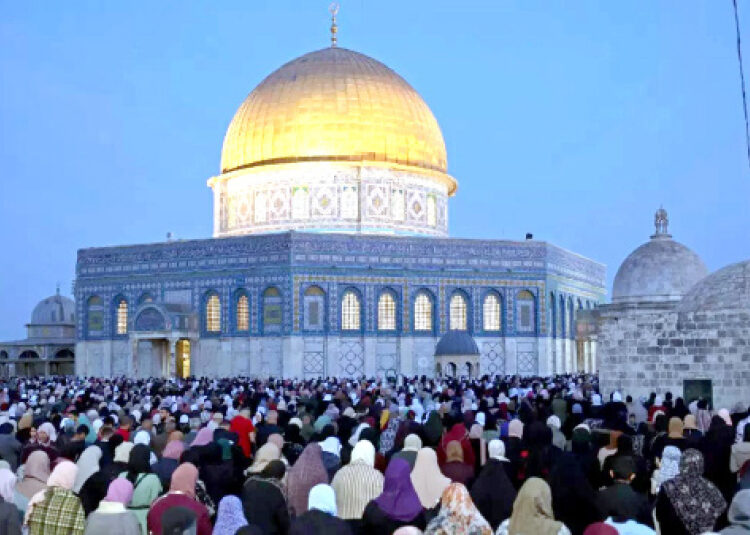Muslims in Nigeria are one with other faithful all over the world as they celebrate Eid-el-Adha, more commonly known as Eid el-Kabir, meaning “Feast of the Sacrifice”. This is in remembrance of the willingness of the Prophet Abraham (pbuh) to sacrifice his son on Mount Moriah in obedience to Allah’s command.
In a rare show of total devotion and submission to Allah’s will, both father and son had submitted themselves and the sacrifice was about to take place when Allah ransomed the son with a ram, symbolizing a demonstration of total submission to Allah and a proof of complete obedience to His will.
Muslims, who have the means, are enjoined to offer sacrifice with either ram, camel or cow on this blessed day.
The sacrificed animals are divided into three parts. One third of the meat is given to relatives, friends and neighbours; another third is retained for the family while the last third is given to the poor and needy. To demonstrate the charitable practice among the Muslim community, concerted efforts are made during Eid-el-kabir, to see that no impoverished person is denied an opportunity to partake in the sacrificial feast.
“It is neither their meat nor blood that reaches Allah; it is your piety that reaches Him”. – Qur’an 22:37.
The great lesson here is that, it teaches forbearance, hope and strong faith in Almighty Allah who through His Grace will reward us richly in this world and ultimately in the hereafter.
Muslims are, therefore, advised to hold firmly to this directive, and in the process reap Allah’s permanent blessings.
The core of Islam, as a religion, as revealed by almighty Allah, to all of His Messengers and Prophets, is unconditional acceptance of, and unreserved submission to directives coming from Him. While only pilgrims performing Hajj in any particular year observe the rites of that fifth pillar of Islam, the rest of the Muslim world join in celebrating the culmination. The lessons of this festival are that we must have absolute sustainable belief and total submission to the will of Almighty Allah, give charity and love our neighbours.
Essentially, Islam’s attitude towards ritual slaughter which Eid-al-Adha, as we mark today symbolizes, is not that of blood atonement, or seeking favour with God through death. Rather it is the act of thanking God for one’s sustenance and also personal sacrifice of sharing food with other humans.
Although, the solemn pronouncement of Allah’s name over the sacrifice is an essential part of the rite, Eid al-Adha is also a harvest day. All the good work done in the service of Allah are rewarded and all believers reap the fruits of their good deeds as Allah grants His mercy and blessings abundantly without measure.
Again, Eid al-Adha transcends all limits of human life. It marks a day of victory for the Muslim as they reflect on the circumstances that culminated into the special day as well as hold a strong command over their desires, exercise a sound self-control and enjoy the test of a disciplined life. And once a person acquires these qualities, he has achieved his greatest victory, because the person who knows how to control himself and disciplines his passion will not be prone to sin, including vices such as indecency, jealousy, greed among others.
What we require to overcome our own peculiar trials and earn similar monumental blessings permanently is total and unquestioning surrender to the will of Allah in the conduct of our daily affairs.
Essentially, the Eid-al-Adha teaches us so many virtues including the virtue of sacrifice, sharing and caring for each other. Now, more than ever before, we need these virtues both in our individual and national life.
The various threats to security, as well as the numerous forms of corruption bedeviling our society and the resultant implications of these for the economy are nothing but results of lack of consciousness of ultimate accountability to God, especially in the life to come. This is also true of the mistrust that hinders cordiality among our various ethnic and religious groups.
As Muslims all over the world mark this important event in their religious life, we join them in celebrating the feast and ultimately urge Nigerians from all walks of life to imbibe the virtues of peace, tolerance, sharing and caring which Islam epitomizes, so as to further move our dear country forward.
Indeed, what we need, as a nation, are sincere, concerted and sustained efforts towards propagating the kind of God-consciousness demonstrated by Prophet Ibrahim (pbuh). This will surely guarantee a lasting solution to all the challenges confronting us and our life here on earth will be much more peaceful, trouble-free and a guarantee to a glorious hereafter.





